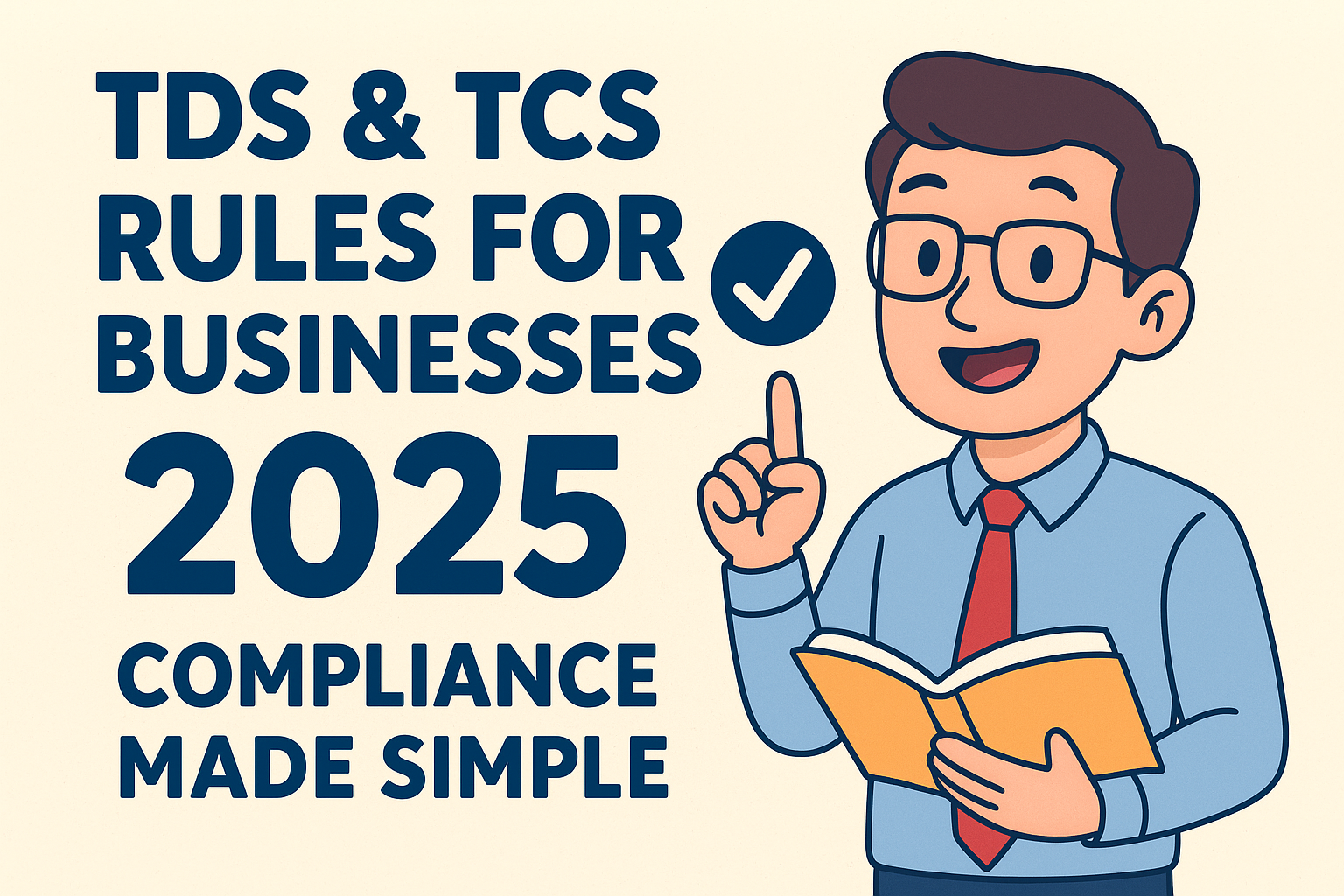When it comes to running a business in India, one of the most common worries is “tax compliance.” Every business owner has to deal with multiple taxes, forms, and deadlines. Among them, TDS and TCS Rules are two important parts of the Indian tax system.
Many business owners find these rules confusing, but if explained in simple language, they are not that difficult. Let us understand the meaning, rules, and compliance requirements of TDS and TCS Rules for businesses in 2025.
Table of Contents
What is TDS (Tax Deducted at Source)?
TDS is a system where tax is deducted at the time of making certain payments, instead of waiting for year-end.
- Example: If a business pays rent of ₹60,000 per month, it has to deduct TDS @ 10% (₹6,000) before paying the landlord and deposit it with the government.
This ensures that the government receives tax in advance and not only after filing ITR.
Common Payments Where Businesses Must Deduct TDS:
- Salaries – Employers deduct TDS as per employee’s income slab.
- Rent – TDS @ 10% if annual rent exceeds ₹2,40,000.
- Contractor Payments – TDS @ 1% or 2% depending on contractor type.
- Professional Fees – TDS @ 10% on payments to CA, lawyer, consultant etc.
- Commission or Brokerage – TDS @ 5%.
What is TCS (Tax Collected at Source)?
Unlike TDS, where the business deducts tax while making payment, in TCS the business collects tax from the buyer at the time of sale.
Example:
If a business sells scrap worth ₹1,00,000, it must collect TCS @ 1% (₹1,000) from the buyer and deposit it to the government.
Common Cases of TCS:
- Sale of scrap
- Sale of motor vehicles above ₹10 lakh
- Sale of liquor, timber, minerals
- Foreign remittances and overseas tour packages
- Sale of goods above ₹50 lakh in a year (applicable for businesses with turnover above ₹10 crore)
Difference Between TDS And TCS Rules
| Point | TDS | TCS |
|---|---|---|
| Who deducts/collects? | Payer of income | Seller of goods |
| When deducted/collected? | At time of making payment | At time of sale |
| Examples | Salary, Rent, Professional fees | Scrap sale, Cars above 10L, Goods above 50L |
Compliance Requirements for Businesses
Running a business means not only deducting or collecting tax but also following proper compliance:
1. Obtain TAN
Every business that deducts or collects TDS/TCS must have a TAN (Tax Deduction and Collection Account Number). Without TAN, you cannot deposit TDS/TCS.
2. Deposit with Government
- TDS deducted must be deposited by the 7th of next month (except March, which is 30th April).
- TCS collected must also be deposited by the 7th of next month.
3. File Quarterly Returns
Businesses must file TDS Returns (Form 24Q, 26Q, etc.) and TCS Return (Form 27EQ) every quarter.
4. Issue Certificates
- TDS Certificate (Form 16/16A) must be given to deductees.
- TCS Certificate (Form 27D) must be issued to buyers.
Penalties for Non-Compliance
If a business fails to follow TDS/TCS rules, there are strict penalties:
- Interest – 1% to 1.5% per month for late deduction or late deposit.
- Penalty – Equal to the amount of TDS/TCS not deducted/collected.
- Disallowance of Expenses – If TDS not deducted, related expenses cannot be claimed as business deduction.
So, ignoring TDS/TCS can increase your tax burden heavily.
Tips for Easy Compliance
- Use accounting software with in-built TDS/TCS features.
- Always check if payment is above threshold before deducting TDS.
- Reconcile TDS/TCS challans monthly to avoid mismatch.
- File returns before due dates to avoid late fees under Section 234E.
- Consult with taxgiveindia.com if confused.
Conclusion
TDS and TCS may look complicated, but once you understand the basics, they are just part of regular business compliance. Deducting or collecting tax at the right time saves you from interest, penalties, and unwanted notices from the Income Tax Department.
For businesses in 2025, compliance is not optional – it is compulsory. So, stay updated with TDS & TCS rules, use technology to simplify compliance, and focus on growing your business tension-free.
